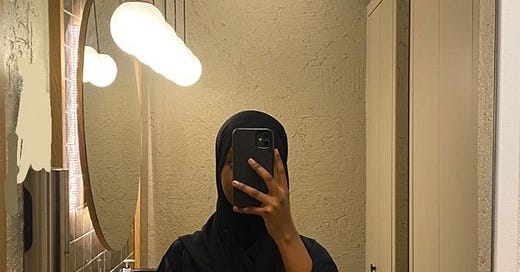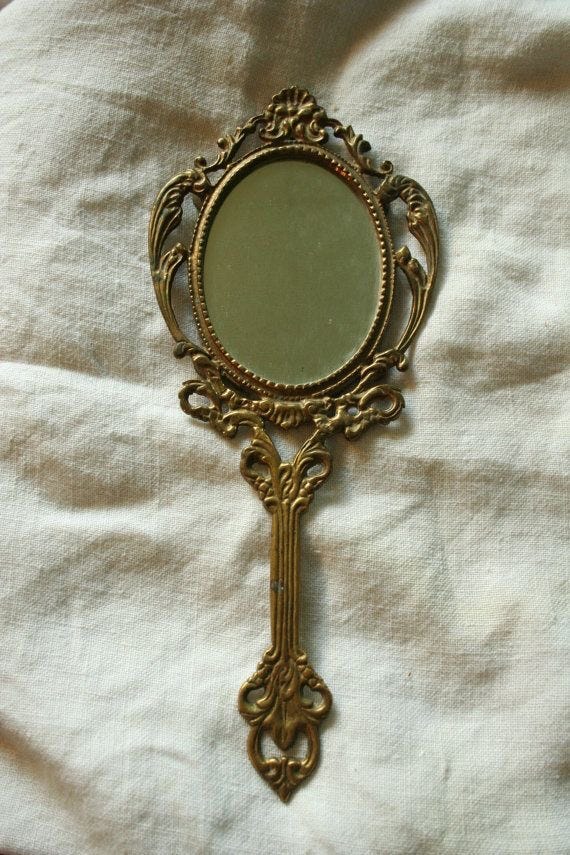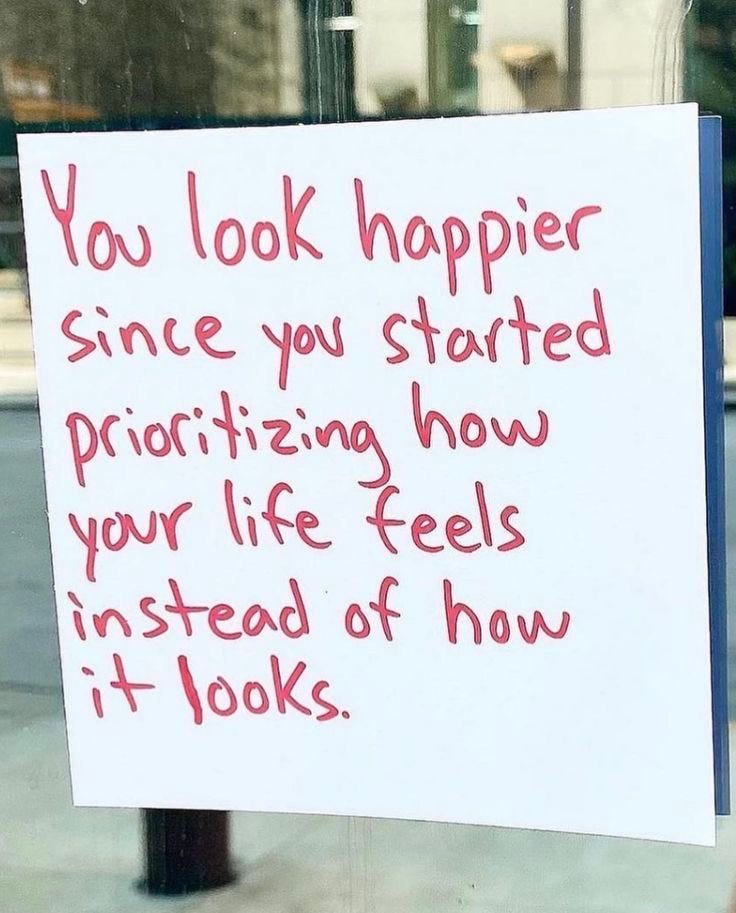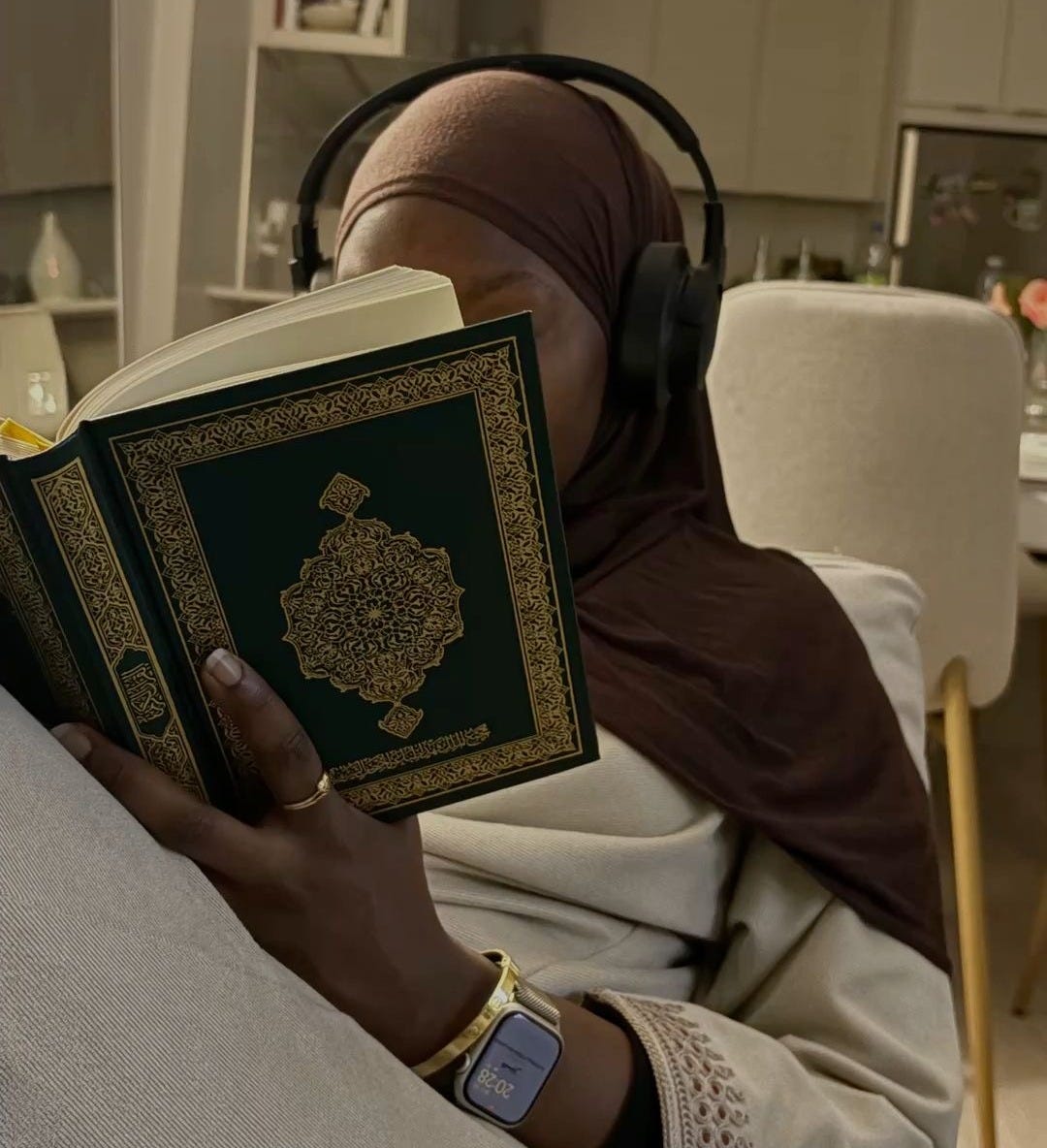Disclaimer: The aim of this piece is to be true to what a Hijab is, what it demands of us, and how we all can / will struggle with it in our own way. Regardless, of where you are in the journey the hijab tests us all. So, please do not feel judged but rather understand that we are all trying our best to accept and practice the hijab.
The first draft of this essay was all intellectual and clinical. I think I was trying to distance myself from the rawness of what I was feeling—trying to explain away something I hadn’t fully come to terms with. I was **trying to reconcile this feeling of being ‘unpretty’ because of something I love and appreciate so much: the Hijab. So, here is what I was always meant to share.
The night of my first iftar dinner in 2025, I stood in front of my mirror for the customary last look. As I looked at my reflection, I was proud- I wore a beautiful, traditional Hausa blouse and skirt, and it hugged all the right places as it’s supposed to. But as a Hijabi, I concealed every inch of what was happening with an Abaya. My hair was firmly secure in my unmovable khimar-hijab style. My skin was aglow without a dollop of makeup. I brushed my eyebrows, so they stopped looking like fuzzy caterpillars and hydrated my lips with a clear, shine-proof lip balm. My perfume was so subtle—you’d have to hug me to smell the amazingness that I knew was happening. No heels, no statement jewellery. Everything I knew of hijab; I was practising at my best. And like I said, I was proud of what I saw in the mirror.
Until I arrived.
Our host looked stunning. A crisp white tee tucked into a champagne silk skirt, a sleek new bob, minimal but radiant makeup, accessorized like a queen and boy did she smell incredible even from the entryway. Then came the other women, each one adding to the room’s glow. We were a room full of non-hijabis and hijabis at different stages of our journeys and suddenly, I felt like the odd one out. Not because I wasn’t beautiful, but because no one would see that I was. My hijab had done its job—it had veiled me. And in that moment, I felt it— invisible.
It didn’t matter what I wore underneath the abaya, or that I was having a great skin month, nor that my perfume was heavenly. None of that mattered because ultimately being a hijabi means accepting that the world might never fully see your aesthetic or visual beauty. And that gutted me.
To be surrounded by beautiful Muslim women and feel like the ugliest of the bunch- and that’s not factoring in that I am WestAfrican in a room full of South Asian, Middle Eastern and European women. And no, this is not self-hating because let's be honest, the fact that loving black aesthetics is still talked about like something revolutionary means that as a society it is not the norm. And though I have no issue with my blackness every now and then the common majority viewpoint does rare its ugly head until I show it whose boss.
Now back to the original story.
What I was feeling wasn’t as simple as feeling ugly more like wearing the hijab made me feel devoid of attractiveness. As in, it was hard for me to view myself as appealing (someone whose presence is captivating enough that it pulls those around them closer). And as a woman that’s a tough pill to swallow. And as a woman in the West in 2025 it is particularly gut-wrenching when our aesthetic contribution is attached to our worth— be it socially, professionally or romantically. You name it, a woman’s beauty will factor into it. And her physical appearance is one of her strongest currencies.
Before we continue, I want to make it clear that this essay isn’t about me questioning my commitment to follow Allah’s commandment— in actuality, I am more inspired to root myself in my hijab. What I am struggling with is vanity. The ache of knowing that because I chose this path at 13, I walk around unaware and unappreciative of my own physical beauty—and in the age of beauty, aesthetics and attention that is hard. That while others enhance and showcase their beauty, I preserve and protect mine. And in doing so, I’m often bypassed.
As I write this, it dawns on me how of course wearing the hijab would do all that I am struggling with. After all, the hijab’s literal translation is ‘a veil’. A screen. A barrier. So, what else did I expect but for it to screen my beauty and who saw the full extent of it too. Why am I caught off guard when it does exactly what it’s supposed to—when it shields me from the gaze of a world that demands constant access to women’s bodies?
The hijab is a counterculture move. It refuses to participate in the economy of visibility. It says: not everything beautiful has to be seen by everyone. And that kind of beauty? It’s earned. It’s reserved. It isn’t for cheap consumption.
I think it is incredible (for lack of a better word) that it’s taken me so long to recognise that the beauty of the hijabi is earned even by herself. But also, that truly embracing the hijab demands redefining what it means to be beautiful. It demands us to value the inaccessibility and oddity of how we present exclusively. It demands seeing beauty as something above aesthetics and how it titillates us. And most of all wearing the hijab forces us to make space to be who we are—without competing. Without shrinking or shouting. And when we try to force the hijab into modern beauty standards, we lose so much of its power. The real work is learning to recognise our beauty within its boundaries—not despite them. Because if someone can see the beauty of a hijabi without the contour and curls, without the lashes and liner, without the trendy colours and clothing, without her trying to ‘halal-ify’ and participate in what’s in—then they truly see her. They see her intellect, humour, confidence, grace, character, resilience, compassion, leadership. They see the parts of her that last longer than beauty ever will.
As I continue to think about the relationship between hijab, beauty and vanity. I am re-aware that so much of our discourse about the hijab is about why women wear it. Whether it is oppressive or limiting. But we rarely talk about what it frees us from. That the hijab takes us out of the race for beauty. Out of the exhausting chase for validation. And that might just be the most liberating and beautiful thing.
So back to that night.
When I got home and jumped on FaceTime with my sisters, just catching up like we always do. Before I could say a word, both of them commented on how beautiful I looked. They gushed over my abaya and hijab—the same ones I had spent hours feeling insecure in. One even asked me to save the outfit for her. Thus, reinforcing the time-old sentiment that ‘beauty is in the eye of the beholder’. But more importantly, that the hijab doesn’t take anything away from us—it adds. It adds depth. It adds dignity. It adds a kind of grace that isn’t flashy but lasting. We just must stop measuring it by standards it was never meant to fulfil.
So, yes, maybe I am less visually striking to the world in my hijab. But I feel more beautiful to myself and in the eyes of those who see wholistically. I feel more authentic and rooted, radiant in my own way. Not trendy. Not filtered. And with that, I reestablish my intention 18 years later to uphold the Hijab as best I can.
Until next time,
Halima.
p.s. when I decided to write this piece I also chose not to make this a hijab 101 piece. I do understand that for someone reading this piece without any prior knowledge of hijab, haya and Islam many questions will arise. And if that is you then, I want you to take this as your push to read more into these topics. There are hundreds of articles, essays, posts and literature of every shape and size available to educate you on hijab and beyond. And always restricting the conversation to ‘what is hijab’ and the very introductory nature of our discourse on the subject is limiting to something that encompasses every aspect of a Muslim’s life. And ultimately, this religion of 2 billion strong isn’t going anywhere rather Muslims and Islam are tied to the fabric of the life we all live and you will have to interact with us regardless. So why not get informed?







A beautiful piece subhanallah, it’s definitely opened my eyes a bit further and maybe it’s provided me with a push to think of things more deeper. Sometimes I find it difficult to wear the hijab when I know I would like prettier without it but, like you mentioned, I remind myself that’s the whole purpose of it! Thank you for your reminder 🫶🏽
such a beautiful post subhanAllah. it so accurately encapsulates everything i’ve also ever felt towards the hijab ever since i started wearing it - having to come to terms with the fact that the hijab’s main purpose is to veil your beauty was such a hard step but it taught me the wisdom behind what Allah SWT commands us and showed me that modesty can be beautiful too. i feel like a very big thing is social media since there are many more “hijabi influencers” nowadays and in my experience i was subconsciously comparing my hijab to theirs, causing me to feel insecure and “not pretty enough”. but in doing that i realised that hijab was starting to become more of an aesthetic and more “performative” for other people when that wasn’t what had been taught at all; hijab should be for Allah SWT. over the years i have grown to love wearing the hijab alhumdulilah as i have finally learnt that it doesn’t take away from my beauty but only adds to it, it has now become such an integral part of my identity for me. may Allah SWT allow us all to honour the hijab and make it easier for us all, ameen. 🤍 thank you for such a beautiful and relatable post.